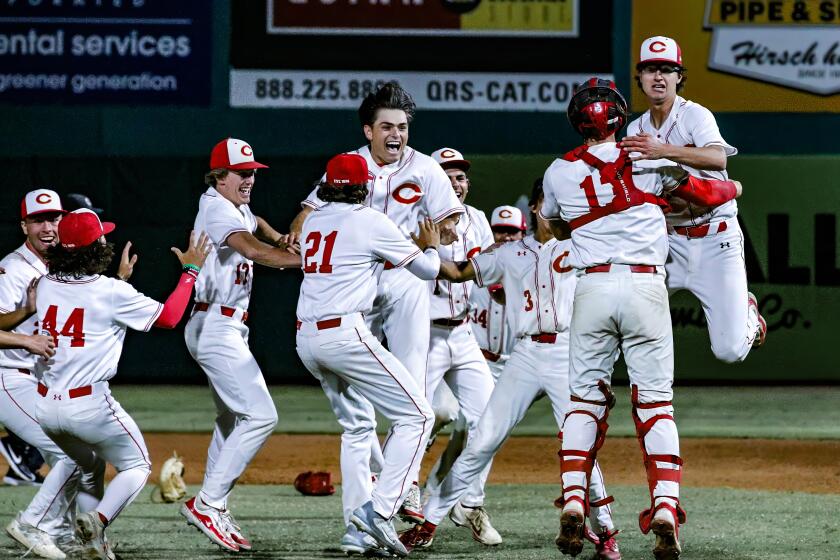Bill Seeks to Curb Sports Violence
- Share via
WASHINGTON — Darryl Stingley, an emerging star with the New England Patriots, was running a third down pass pattern in a pre-season contest a few years back when he was leveled by a vicious hit from Oakland Raider Jack Tatum.
Stingley, sprawled on the turf of the Oakland Coliseum, never got up. In fact, it was to be the last time he walked in his life.
Coming clearly after the football fluttered incomplete, the hit crushed the third and fourth vertebrae in Stingley’s spinal column, leaving him permanently paralyzed at age 26.
Several years after the Aug. 12, 1978 incident, Tatum confessed that he and teammate George Atkinson actually competed to see how many opposing players they could injure.
The Stingley incident is perhaps the best known example in the past decade of the dark side of professional sports--excessive and sometimes premeditated violence. This ugly aspect of competition includes the blatant cheap-shots in football, stick-swinging and skate-slashing in hockey, fist-fighting in basketball and soccer and the bean ball in baseball.
One Congressman thinks he has the answer to the problem.
Rep. Thomas Daschle (D-S.D.) has proposed the Sports Violence Arbitration Act, a measure that would mandate the professional sports leagues to set up league-sanctioned courts to examine acts of violence on the playing field.
The arbitration panels would have the power to force offending players to pay the medical costs and salary of the injured player. The panels also could fine or suspend players, take away a draft pick from a club and hold clubs financially liable for the excessively violent conduct of players.
Decisions made by the panels could be appealed to the U.S. Court of Appeals.
Under the bill, the arbitration panels would be negotiated into the individual leagues’ collective bargaining agreements with the players.
In a statement to the House, Daschle said, “Without question, excessive violence in professional sports has become a serious problem in the United States.”
He added, “Nevertheless, I believe that the major leagues can act as the best policemen of the their own games if they are only provided with the incentive to establish an effective deterrent system.”
He defined sports violence as “physical force or contact which creates a risk of injury and which is unnecessary for effective participation in the sport consistent with the competitive goals of the sport, is intended to injure, or is intended to create a threat of injury.”
A subcommittee of the House Education and Labor Committee is expected to hold hearings on the measure this fall.
Daschle’s measure is not the first of its kind. An unsuccessful 1980 House bill sought to make excessive violence in sports a criminal act subject to fines of up to $5,000 and imprisonment of up to a year.
Officials of the major sports leagues say Congress has no business nosing into the issue.
Lee MacPhail, the president of the Major League Baseball Players Relations Committee, called the new legislation “an unwarranted government intrusion” into professional sports.
“I don’t think there’s any need for the government to get involved in this. We’ve been able to handle this pretty well at the league level in baseball,” MacPhail said. “I think they’re over-reacting.”
But he said that a section of the collective bargaining agreement he hammered out with the player’s association calls for a new study of the use of the beanball and a review of current warning rules on the matter.
Donald Fehr, the president of the Major Leagues Players Assn., said: “Do I think the Congress of the United States should get involved every time there’s a fight? I would say no. But I would have to see the legislation before I would comment on the substance of it.”
Doug Allen, secretary-treasurer of the Federation of Professional Athletes, an umbrella labor group that includes the NFL, USFL and Major Indoor Soccer League players associations, echoed the concerns.
“As a general principle, we would be concerned about the interjection of Congress into that issue, wholesale,” he said. “We don’t think the situation in football is so extreme that we need additional help. Mandating arbitration panels would not be the answer.”
Allen, who also heads the USFL’s players union, added that a Congressional mandate demanding the players unions and the leagues’ management to include a section on arbitration panels “flies in the face of traditional bargaining.”
NFL spokesman Joe Browne said in a league statement: “I think our rules changes and statements during recent years would indicate we share the Congressman’s views on undue violence in sports. However, without having seen the actual bill, I think we might have some reservations about the practicality of it.”
“We feel that these matters can better be handled by the sports leagues themselves,” Browne added.
National Hockey League Commissioner John Ziegler refused comment on the legislation.
More to Read
Go beyond the scoreboard
Get the latest on L.A.'s teams in the daily Sports Report newsletter.
You may occasionally receive promotional content from the Los Angeles Times.










